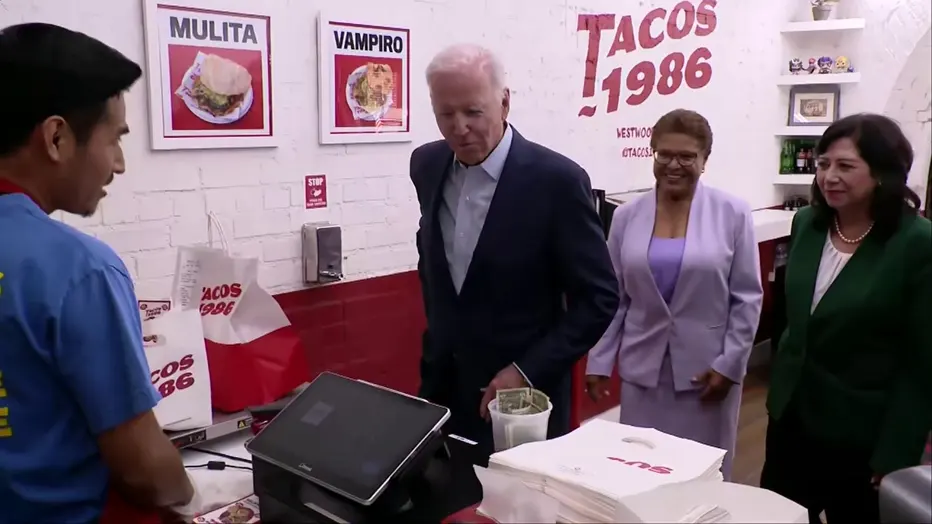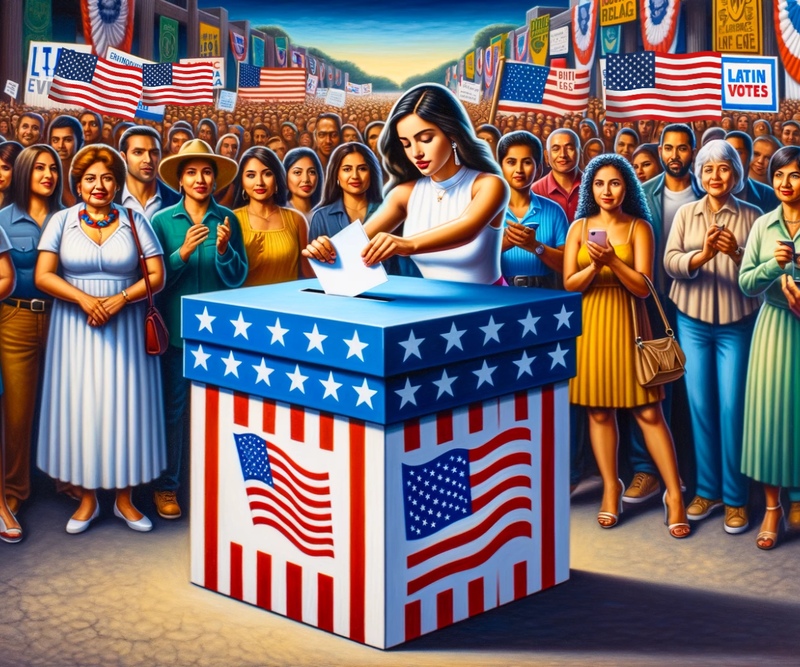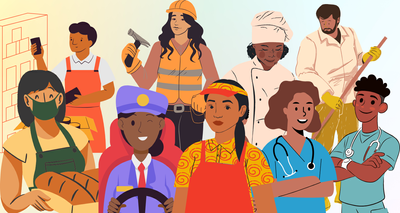The Latino vote has played a pivotal role in U.S. presidential elections for decades, sparking a growing political interest in the Latinx and Latino community and their electoral participation. In 2022, it was estimated that 34.5 million Latino were eligible to vote, making this racial and ethnic group the fastest-growing in the U.S. electorate since the last midterm elections. The number of eligible Latinx voters has increased by 62 percent since 2018, indicating that for the upcoming elections, 38.5 million Latinos/x will have the opportunity to exercise their right to vote, as highlighted in a report published by the Pew Research Center.
The Hispandering Starts
Politicians recognize the important role of the Latino vote in reaching the White House. During election periods, they devise strategies and campaigns to attempt to connect with the community, a phenomenon known as "hispandering." Despite a notable increase in the number of Latino voters, Latino/x participation in electoral processes remains low. Many politicians have been guilty of it. Politicians have put on a sombrero and walked into a local taco shop in L.A. thinking this is appealing or will guarantee the Latinxs’ vote. An example was when former President Trump posted a picture of himself eating a taco bowl from his office on Cinco De Mayo.
Historically, Hispandering happens right before the election as if politicians wait until the last minute to grab the Latino’s attention. In 2020, seven weeks before the elections President Joe Biden was in Florida with his Latino supporters for a Hispanic Heritage Month event when he started his speech. “I just have to say one thing,” Biden then raised his cell phone and played Luis Fonsi’s chorus to “Despacito”. Many criticized it as stereotyping and tasteless.
In the 2020 presidential elections, a total of 16.6 million Latinos exercised their right to vote out of the 34.5 million eligible. Despite this gap, politicians actively seek to secure these votes. According to a report from the Latino Policy & Politics Institute at the University of California, Los Angeles (UCLA), President Joe Biden won the majority of Latino voters in 2020 against his opponent, Donald Trump. The report highlights the crucial nature of these votes in securing the presidency, underscoring the significance of the Latino voters beyond common perceptions.

Currently, fifteen presidential candidates have announced their candidacy for the 2024 U.S. Presidential Election, with eight being Republicans, four Democrats, and three independents. The ongoing contest is once again led by the incumbent president, Joe Biden, 81, and former president Donald Trump, 77.
Traditionally, Latinos have supported the Democratic Party and its progressive policies, as evident in the 2020 elections where Biden emerged as the victor. However, Latino loyalty to the Democratic Party is now at risk. Recent polls conducted by The New York Times, Univision, and NBC News indicate a decline in President Biden's popularity over the past year. Another survey by CNN revealed that Biden still maintains a four-point lead among the Latino community, marking a decrease compared to 2020 when Biden secured the Latin vote by 33 points.
Coverage and advertising for presidential campaigns are key when reaching the Latino/x community. Recently, actor John Leguizamo announced on November 16th on his Instagram an alarming fact that went viral about the largest U.S. Latino-reaching TV news network Univision. Univision canceled Biden’s campaign ads in key voting states that were supposed to run during the hour-long interview Univision did with former president Donald Trump on November 9th at his home in Mar-a-Lago. Political experts and journalism advocates are sounding the alarm because most of U.S. Latinos get their news from Univision and this is detrimental when making an informed decision as a voter in a democracy.
Univision faces much backlash not only from their own veteran journalists like Jorge Ramos and ABC’s The View Ana Navarro but from Hollywood and journalistic ethics advocacy groups because the power the network has over presidential coverage is not practicing fair, ethical and two-sided or unbiased journalism. Right after the interview, Univision also canceled an interview with President Biden’s Hispanic media director Maca Casado that was supposed to be in response to Trump’s interview to balance Univision’s coverage.
President Biden's re-election campaign is once again spearheaded by Julie Chávez Rodríguez. During this period, the $25 million strategy will focus on creating personalized advertisements, considering the complexity of the Latino community and the need to reach each voter regardless of their country of origin. Chávez has stated to NBC News that they will use narrators with different accents and publish messages on popular Latino channels such as television and digital platforms.
Why are Latino votes so important?
In 2020, an unprecedented event occurred, Latino voters solidified as the second-largest electoral group in the United States, marking a significant increase of 30.9 percent compared to the 2016 presidential elections. A detailed analysis of voter turnout revealed that, in key states such as Arizona, Colorado, Georgia, North Carolina, Nevada, and Virginia, young Latinox, aged 18 to 29, emerged as the most numerous segment within the Latino community participating in the 2020 general elections.
This young demographic also played a crucial role by providing over 10 percent support to the current president, Joe Biden. It's worth noting that, on average, U.S.-born Latinos median age to vote is 30, in contrast to whites, whose average voting age is 44. This underscores the growing importance of the Latino population in the American political landscape, especially among the youth, and how their decisions are shaping the country's elections and policies.
"Latino voters have been the swing factor in some swing states for a number of electoral cycles, but especially now, given the size that they have attained across the country and in key pockets," explained Victoria DeFrancesco Soto, a political scientist, to NBC News.
Key states for presidential candidates include California, Texas, Florida, and New York, with the first three having a higher Latinx presence. On the other hand, the Pew Research Center has noted that every 30 seconds a new Latinx turns 18, allowing them to vote in the upcoming 2024 presidential elections.
Latino Organizations Encourage Young Latinxs to Exercise Their Voting Rights
For the civic and social justice organization, Poder Latinx, every vote counts, and that's why it is dedicated to informing and promoting the importance of voting in the Latino community, with a special focus on the youth. Latino voting is considered a powerful tool for civic engagement, allowing Latinos to be agents of change. Therefore, Poder Latinx focuses on empowering the Latino and Hispanic community in Arizona, Florida, Georgia, and Washington, urging them to exercise their right to vote in every election, including local and state elections, as a way to promote progressive advances that directly impact the community.
"We have to close that gap. Many times people think that one vote doesn't count, but that's a big mistake. We have the political power to make changes and reverse laws that negatively impact us," said Yadira Sánchez, executive director of the civic organization Poder Latinx to El Tiempo Latino.
In October, Poder Latinx held the second Poderosas Legislative Summit 2023, an event that brought together dozens of young Latinas with influential and emerging leaders from the community. The main purpose of this summit was to empower the new generation of Latinas, providing them with essential tools to engage in socially relevant issues such as climate change, immigration, technology, economic justice, and reproductive rights. This event served as a platform to foster leadership and active participation among young Latinas so that they can promote change within their communities and have an impact on society. Those wishing to register to vote can visit the Poder Latinx website and fill out the form that will take no more than two minutes. Sánchez emphasizes the importance of updating the address in case of moving.
Another organization committed to empowering the new Latinx generation in exercising their right to vote is the civic media organization, Voto Latino. Its founder, María Theresa Kumar, has managed to raise more than $75 million, funds that have been allocated to the organization, allowing them to register more than 100,000 voters. This has established Voto Latino as the largest voter registration and Latinx rights advocacy organization. In addition to its outstanding work, Emmy-nominated Kumar uses social media as a communication tool to inspire transformative change in younger audiences. Those wishing to register can do so from the organization's website.
What should voters be paying attention to leading up to the 2024 election? We asked leaders from @NAACP_LDF , @NextGenAmerica and @votolatino.
— 19thnews (@19thnews) November 6, 2023
(P.S. if you missed this event, subscribe to our newsletter so you never miss another: https://t.co/d9G4yiDxep) pic.twitter.com/BTWsoFhaVZ
As the 2024 presidential elections loom, the voice of the Latinx community emerges as a decisive factor amid uncertainty. Just as their loyalty to the Democratic Party wavers, polls suggest a shift in perception toward President Biden. In this context, the importance of the Latino vote becomes evident, as demonstrated in the past 2020 elections, where Latinxs positioned themselves as the second-largest electoral group. Active participation by young Latinxs is crucial, and it is expected that by 2050, Latinxs will occupy the first place among the largest electoral groups. In this scenario, the Latino community must exercise its right to vote and actively participate in social issues that directly impact their lives.






